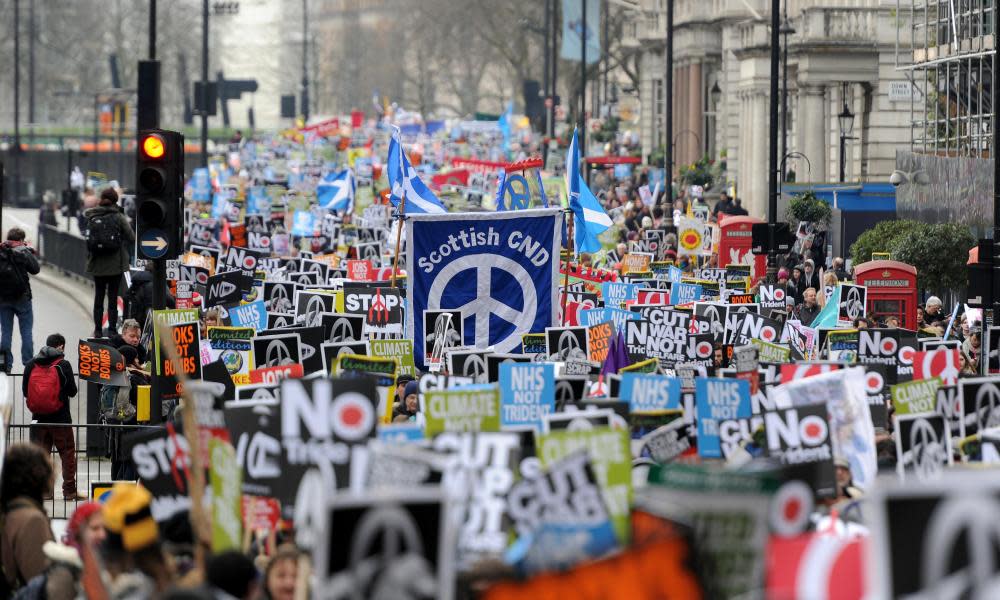UK must take lead on nuclear weapons

As your article on nuclear weapons states (All you wanted to know about nuclear war but were too afraid to ask, 16 July), the use of a nuclear weapons is now more likely than at any time since the cold war. Billions are being spent on modernising superpower nuclear arsenals. The old “deterrence” myth – that they will never be used – is still being deployed, but at the same time Trump is unveiling plans for new “usable” nuclear weapons, and outlining more scenarios in which to use them.
With Trump’s tearing up of the Iran nuclear deal, the dangers of nuclear proliferation in the Middle East are increasing. The possibility of denuclearisation of the Korean peninsula hangs on a thread – a return to threat and counter-threat is an ever-present danger, with potentially catastrophic consequences. But this tide towards annihilation can be turned if the political will is there. Maybe we can’t expect that from the trigger-happy US president, but we should demand it from our own government.
It’s a year since the UN general assembly voted overwhelmingly to support a treaty on the prohibition of nuclear weapons. The UK government has poured scorn on it, but this is a very real global initiative that presents a way out of the accelerating nuclear crisis.
There is much talk of Britain’s standing in the world. This is a way in which Britain could genuinely lead: by supporting the treaty and helping to end the impasse between nuclear weapons states. We ask this of our government, because without such an initiative, the threat of destruction will only grow.
Kate Hudson
General secretary, CND
• Your article points to the 1959 film of Nevil Shute’s 1957 On the Beach as “the first major post-apocalyptic movie”. Revisiting the book and the film after 25 years of researching British nuclear – not atomic – tests in Australia I was struck by Shute’s understanding that global winds would bring radiation from the northern hemisphere to the southern from nuclear warfare that began between “minor” nuclear powers.
The timing of the book and the film are also important in retrospect. Ava Gardner arrived in Sydney on New Year’s Day 1959 to start filming precisely a year after Harold Macmillan made the first visit to Australia by a serving British prime minister. He came to tell the Australian cabinet that Britain would be rejoining the nuclear alliance with the US because it had shown that it could build a thermonuclear H bomb – in Australia – and detonate it off Malden Island in the Pacific in May 1957. The UK would therefore be withdrawing from the Australian test sites and would not be in a position to leave tactical ballistic missiles developed at Woomera Rocket Range as an independent nuclear deterrent as had been argued for by Prime Minister Chifley, Sir Mark Oliphant and the Royal Australian Air Force.
There are intercontinental nuclear missiles in Australia today, but they are American. I am putting the archival evidence for these statements on my website the Rabbitt Review.
Sue Rabbitt Roff
Cellardyke, Fife
• Why perpetuate the myth that the Non-Proliferation Treaty somehow legitimised the nuclear weapons of an “official owners club”? The then five nuclear weapons states were defined as such solely for the purposes of the NPT, which was a bargain between nuclear and non-nuclear states: non-nuclear states had the right to develop civil nuclear power and nuclear weapons states had an obligation to disarm, as clarified by the international court of justice in 1996. The continued refusal of the nuclear weapons states to fulfil their treaty obligations was an important driver for the ban treaty agreed by a huge majority at the UN almost exactly a year ago. All nuclear weapons states, including the UK, are embarking on a programme of modernisation and deserve no kudos for retiring weapons of an older generation.
Joanna Bazley
London
• Join the debate – email guardian.letters@theguardian.com
• Read more Guardian letters – click here to visit gu.com/letters

 Yahoo News
Yahoo News 
